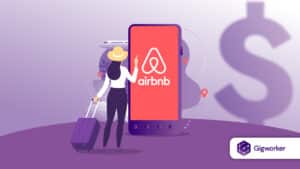In the last decade or so, Airbnb has gone from a tiny, niche company to a behemoth that spans almost every country in the world. With over six million listings in more than 100,000 countries, there’s no question that Airbnb has become a household name!
But what exactly is Airbnb? If you’ve never used it, you might not understand the ins and outs of the website or whether it’s even worth the hassle.
Luckily, we’ve written this article to break down all the details of Airbnb for both hosts and guests! Specifically, we’ll cover:
- What Airbnb is
- Its origins and history, and core business model
- Airbnb safety and security precautions
- The types of listings available
- Whether it’s cheaper than a hotel
- Its impact on different systems.
Let’s get straight into it!
What is Airbnb?
The primary goal of Airbnb is to connect people looking for a place to stay overnight (guests) with available space in personal homes (hosts). This was the initial mission of Airbnb, and still remains the main purpose of their platform.
Airbnb provides an alternative to classic hotels — previously the only real way of staying overnight in a city where you know no one!
Hosts post a listing on the site detailing their space and prices, as well as any other features that make their listing special. Then, guests looking to travel to that area can view what accommodations are available and choose their favorite.
Most importantly, Airbnb handles all the “scary” business side of things.
They’ll process payments, refunds, and disputes, and generally handle the risky elements of rentals. This gives an extra layer of security to both hosts and guests, making staying with strangers a much safer choice than it would be otherwise.
Airbnb for Guests
As a guest, finding accommodation with Airbnb is a pretty easy process.
Firstly, you’ll need to create an account and verify your phone number. Then, you’ll be asked to provide a form of identification. This is the most tedious part of using Airbnb!
Once you’re signed up, all you need to do is browse the listings for your destination and choose one you like.
You can filter your search by criteria such as keywords, specific locations, dates, amenities, and listing type.
For instance, here’s the result of a search for Chicago, IL:

Airbnb will first show you suggestions of places to stay.

You’ll be able to see the listing title, the price per night, and the property’s rating. If you click on a listing, you’ll be able to see more details:

You can also see Airbnb Experiences on the same page that shows accommodation suggestions. All you have to do is scroll down:

Once you’ve picked a property or Experience, you can then book and pay for it through the Airbnb platform.
Also helpful is the reviews section, as this allows you to see what previous guests are saying about the listing (and the host running it). Though it’s not 100% reliable, you can get a decent idea of quality by reading reviews before you commit.
Once you’ve found your listing of choice, lock in your booking!
After payment is made, you’ll receive confirmation of your booking as well as your booking address and any other necessary information.
Get to Know AIrbnb
Airbnb Basics to Understand
Basics you’ll need to know before using the service:
Airbnb for Hosts
Hosts have a high level of control over their listing details. You can rent out almost any space, whether it’s a spare room in your house, a shared bedroom, an entire property, or even a trailer or cabin!
Airbnb has practically every kind of accommodation you could imagine available on its platform, including buildings like yurts and houseboats.
To rent out your property, you should start by reading all of Airbnb’s requirements and policies carefully.
Next, create a free account and a new listing. Here, you’ll input information about your listing like its title, description, photos, special features, and amenities. If you want, you can even offer special services like airport pick up/drop off!
You also have full control over pricing on Airbnb. If you’re not sure what your listing is worth, they provide a handy tool that can give some guidance.
Once your listing is published, you can add or update certain items like house rules and cancellation policies. Otherwise, you’re done for now! All you need to do is wait for guests to book, and then make their stay as pleasant as possible.
Hosts are paid 24 hours after the guest pays for their booking once Airbnb deducts its service fee. Payment methods are varied, and include options such as local and international bank transfers, PayPal, Western Union, and Prepaid Debit Cards.
Read More: How to Become an Airbnb Host
Airbnb’s Origins and History
Airbnb started in 2008 when two of its co-founders were looking for an extra source of income to pay their apartment’s rent.
The two hosts came up with the idea to offer up an air mattress in their living room to local tourists. When they saw success, they created a website to connect people offering similar low-cost accommodation with people looking to travel cheaply.
Thus, the name “Air Bed and Breakfast” was born – later shortened to Airbnb!
In 2009, their catalog expanded to include spare rooms, apartments, and even entire houses. The service also grew to cover greater areas of the US.
By 2011, they founded their first European office in Germany. Later, an EU headquarters was established in Dublin, Ireland.
In the present day, Airbnb covers hundreds of countries across the USA, Canada, the EU, Australia, Asia, and countless other nations.
Airbnb’s Core Business Model: What Do They Do?
Airbnb makes its money by taking a cut each time a booking is made on its site.
This happens in a few ways, but mainly through the service fee deducted when a reservation is made. If you click on a property, you can see a breakdown of these fees on the right-hand side.
Generally, guest service fees are under 14.2%, while hosts are charged 3% or more of their total earnings for each booking. However, this may vary depending on the laws of each country Airbnb is used in.
Airbnb relies on having a wide-reaching, extensive list of hosts. People flock to the site because you can get practically any kind of accommodation anywhere in the world! This variety has been carefully cultivated over the years and is the lifeblood of the company.
Airbnb’s Safety and Security
Airbnb takes the safety of both its guests and hosts very seriously. They have a variety of systems in place to keep people as safe as possible while using their service.
Threats of violence or abuse towards others is never tolerated by guests or hosts.
Dangerous animals, undisclosed weapons, and explosive devices are similarly rejected. Legally owned, disclosed weapons may be allowed so long as both hosts and guests agree to it.
Hosts can refuse or cancel reservations if they feel uncomfortable or unsafe. Airbnb also offers AirCover for hosts, which provides things like guest identification verification, reservation screening, liability insurance, damage insurance, and 24-hour safety phone access.
Finally, the company also provides up to $1 million dollars to cover unreasonable damage to the property (in certain situations).
Types of Listings on Airbnb

1. Entire Place
If you book an entire place, you’ll get private access to a full property. This means neither the host nor other guests will be living in the same space as you during your stay.
Generally, you’ll have access to a kitchen, living space, and one or more bedrooms.
These listings are great if you have a large group and value your private time. However, they’re also expensive.
If you’re planning on sightseeing most days and won’t be home often, they may not be the best choice. However, if you’re planning a staycation — they’re perfect!
2. Private Rooms
If you book a private room, you’ll get a private bedroom that is completely your own.
However, the living areas like the kitchen or entertainment room will be shared, either with your host or other guests staying at the Airbnb.
Some private rooms have an attached ensuite bathroom or furniture such as a desk. These are a good middle ground when it comes to price, offering an affordable stay but still giving you somewhere private to relax.
Some people prefer these to completely private accommodation since it opens up the opportunity to interact with their hosts and fellow travelers. This can add an entire extra level of adventure to your trip!
Keep in mind that shared living spaces might mean stricter house rules, such as no noise after 10 pm or washing dishes immediately after use.
With this option, you’ll get a bed in a shared room either with the host of the rental or with another guest. This could be in a bunk bed barracks-style or a dorm room setup.
They are usually highly affordable, which is great if you normally spend much on travel!
However, if you’re an introvert or want your private space, you might not appreciate sharing your bedroom with someone at all hours of the day and night.
On the other hand, highly gregarious and outgoing people may love the opportunity to interact with other people and share their experiences.
4. Hotel Rooms
Many hotels now list their rooms on Airbnb, meaning you can book a traditional hotel experience on the site as well!
These have the benefits of in-house cleaning staff, large buildings, and tried and tested methods that have been working for centuries. In some cases, they may even be cheaper or similarly priced to equivalent homestay accommodation.
Is an Airbnb Cheaper Than a Hotel?
When it first started, Airbnb was almost always cheaper than a hotel.
On top of this, a lot of people appreciated the homey, personal touch that comes from staying in someone’s house. It gave you a chance to interact with locals, and maybe even eat and drink with them each night!
However, nowadays, this isn’t always the case.
Many Airbnbs are now owned by massive property management behemoths rather than individuals. Plus, even if your host is an individual, features like self check-in means you may never even meet them.
Hotels have responded to the explosion of house sharing by lowering their prices to compete. Meanwhile, as demand increases, Airbnbs have been steadily raising in price to match.
Generally, Airbnb’s will be cheaper if you’re part of a large group or plan to stay for a long time. Often, hosts will give you special deals if you book for a long time since this gives them guaranteed occupancy.
On the other hand, solo travelers or couples might find hotels are the cheaper option. Similarly, if you’re only staying for a single night, hotels will probably give you a better deal.
Airbnb’s Impact
On the Traditional Hospitality Industry
Before Airbnb exploded, staying in the home of a stranger just wasn’t something you would do. If you traveled, you’d book into a hotel in the touristy part of the city.
Airbnb gave people options! Most importantly, they gave people the chance to experience new things and get a more personal look at the cities they visited. This was a revolution in the hospitality industry.
In response, hotels have really stepped up their game in recent years. Many have lowered their prices and offer more amenities to compete with Airbnb.
They’ve also started advertising their rooms on the site, treating it as yet another avenue to find guests.
On the Opportunities of an Individual Property Owner
Previously, offering accommodation for money required numerous expensive certifications and registrations. This meant that only large businesses could operate hotel businesses.
With the rise of Airbnb, individual property owners could offer accommodation without needing tens of thousands of dollars to get started.
Airbnb has allowed average people to create a side (or even main) income through their property!
This was a huge opportunity for people otherwise barred from the accommodation industry, especially if they were facing hardship (as many were) during the company’s birth in 2008.
On Global Travel and Cross-Cultural Connections
One of the main benefits of using Airbnb vs. a traditional hotel is greater immersion in local culture.
When you stay in the home of someone local to the area, you get to see the daily life of a local. This is even more apparent if your host is sharing the property with you! Many people have found incredible connections by house sharing, particularly overseas.
It can be hard to fully experience a foreign culture from the clean, sanitized halls of a hotel.
Often, hotels are in strictly tourist-focused parts of the city, hiding a lot of the genuine experiences offered by the local culture.
Therefore, using house sharing can give you a whole new perspective to a foreign culture — and provide you with far better stories to take home.
On Local Economies and Tourism
Airbnb has had a definite impact on local economies, especially in areas that previously had few accommodation options.
Property owners and local businesses have benefited thanks to the increase in tourism, and subsequently the increase in capital flowing through their community. This has allowed small communities to grow and flourish as tourist destinations.
However, on the other side, Airbnb has made many people worried about rental prices in its most popular areas.
On the Housing Market and People’s Concerns About Affordability
As Airbnb rises further and further in popularity, more people and companies are looking to purchase properties and rent them out as Airbnbs as a relatively safe investment opportunity.
In popular destinations, Airbnbs increase in price greatly! In turn, this can inflate the local rental costs to the point that it prices out the locals. As you can imagine, this can be catastrophic. This is most obvious in hyper-tourist-focused areas such as Paris or New York City.
To combat this, some municipalities are enacting restrictions on Airbnbs. Mostly, these limit how many consecutive days rentals can be offered for, and the maximum number of days per year that a property can be used for short-term rentals.
Wrapping Up
As it’s risen to a worldwide phenomenon, the humble beginnings of Airbnb have become much, much more complicated.
For hosts, it’s still a solid way to make some extra income on the side — especially if you live in a unique or high-demand area.
For guests, Airbnb can still offer unique experiences and cheaper travel if you know where to look. However, with hotels working to compete with them, Airbnb may not always be the best option for travelers.
The most important factor is to be fully informed before making a decision about accommodation on your next trip. Hopefully, this article has proven to be a helpful exploration of Airbnb — safe travels!
Sources
The sources we reviewed to write this article.
See Sources
- https://www.investopedia.com/articles/personal-finance/032814/pros-and-cons-using-airbnb.asp
- https://news.airbnb.com/about-us/
- https://trvlguides.com/articles/what-is-airbnb
- https://trekbaron.com/accommodation-types-airbnb-vrbo/
- https://www.nerdwallet.com/article/travel/are-airbnbs-more-cost-effective-than-hotels









